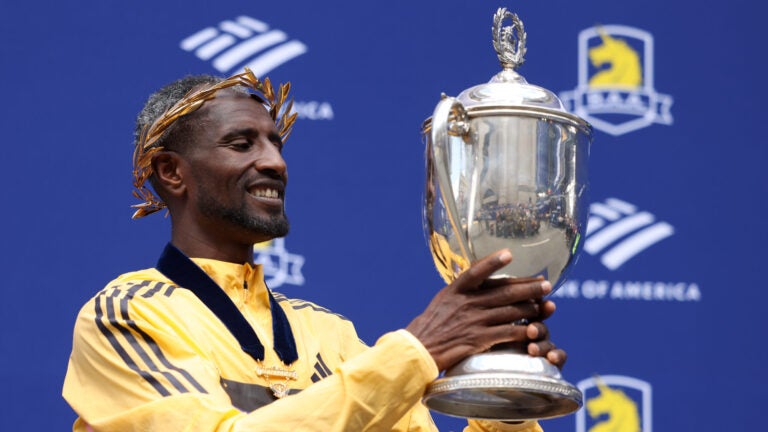Get the latest Boston sports news
Receive updates on your favorite Boston teams, straight from our newsroom to your inbox.

While the Olympic marathon remains one of the classic events of any Summer Games, it usually has a major (and not necessarily good) effect on the elite field in that year’s Boston Marathon.
Most of the top American runners tend to skip Boston in an Olympic year, as U.S. trials generally happen prior to April. And while many other national programs use a more vague Olympic selection process (other than a one-day trial run), it can be a system in which athletes gravitate towards flatter and potentially less challenging courses.
This was a process outlined earlier in 2024 by Boston Athletic Association senior director Mary Kate Shea, who spoke with longtime Boston Globe reporter John Powers about how athletes look at the preliminary Olympic team lists released by many countries.
“You’re put on the list and that feeling of hope and expectation probably lasts for a week or two, and then you’re down to business,” Shea told Powers. “Then it’s, ‘What course is going to challenge me?’ ‘Where am I going to be able to excel?’ ‘Where am I going to podium?’ ‘Where am I going to win?’
“Even though you’re on that list, you still have to continually prove yourself until they make that final selection,” Shea added.
Elite runners like former world record-holder Eliud Kipchoge, aiming for a third consecutive Olympic gold, may have chosen to run the London Marathon (also held in April) due to it being a flatter and less punishing course than Boston.
Not everyone views Boston as negative preparation for the Olympics, however, especially in the context of the Paris 2024 marathon course.
Released in 2022, the route of the Paris Olympic marathon includes multiple major elevation changes as the athletes run over the top of (and back down) a pair of hills.
When it comes to preparation for hills in a marathon course, only one of the World Majors offers similar elevation changes: Boston.
This exact concept was outlined by 2024 Boston winner Sisay Lemma, who stormed out to an early lead and survived the Newton hills on Monday.
“The reason I came to run [here] is the Boston Marathon is similar to the Paris Marathon because of the hills, and I know that it will help me,” Lemma said after the race. “I’m glad that I did it, and it will help me there too.”
In Lemma’s case, he may have felt he needed extra practice on hills. In his three previous attempts in Boston prior to 2024, the 33-year-old Ethiopian DNF’d twice and finished a distant 30th. While he ran a remarkably fast 2:01:48 time at the 2023 Valencia Marathon, it was on a flat course that doesn’t really replicate the challenges he could face in Paris.
Now, however, Lemma has seen that he can manage the uphill/downhill running that will be crucial in the Olympics.
Of course, Lemma isn’t officially on Ethiopia’s Olympic roster for the marathon yet (as it’s a country that does not hold a one-day trial like the U.S). But with his performance in Boston—not only winning but doing so on a hilly course—Lemma has made it seemingly impossible to not warrant inclusion.
Receive updates on your favorite Boston teams, straight from our newsroom to your inbox.

Stay up to date with everything Boston. Receive the latest news and breaking updates, straight from our newsroom to your inbox.
Conversation
This discussion has ended. Please join elsewhere on Boston.com